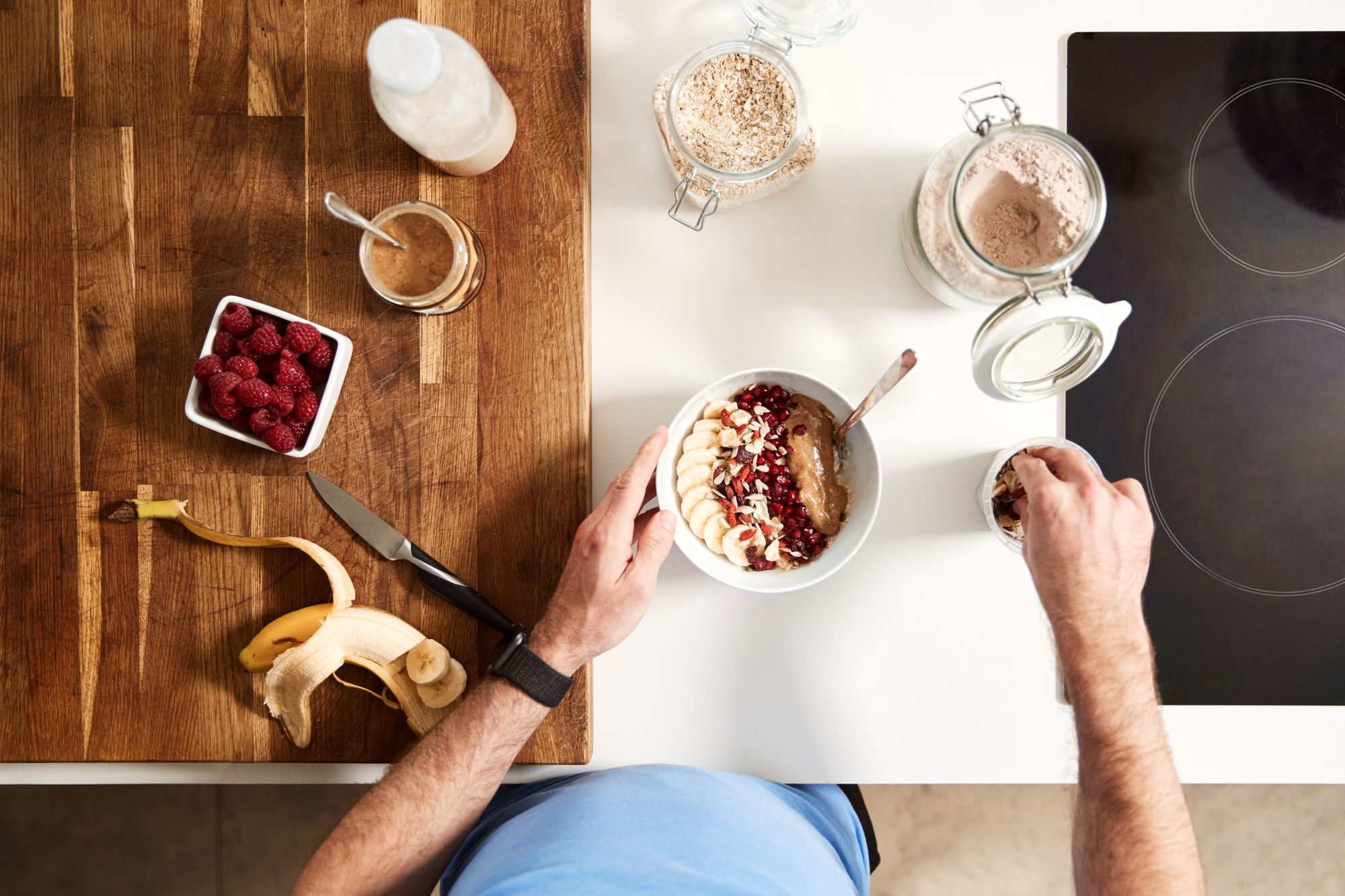Counting Calories for Weight Loss: When Is It Ever Okay?
Your calorie balance determines your weight. That's for sure. But does that mean you should count calories in your food for weight loss purposes?

With the rising popularity of intuitive eating, the whole idea behind calorie-counting has become somewhat … a ‘dirty’ topic to talk about ?♂️
Admitting that you count calories in food can invite a lot of hate from others – especially those who believe that “calories don’t actually tell you anything meaningful”.
Guess what? They’re wrong.
Calories do count; at its core, weight management comes down to your energy balance. Eat in a calorie surplus, and you’ll gain weight. Eat in a calorie deficit, and you’ll lose weight.
Although, there is one thing they may be right about.
While you do need a calorie deficit to lose weight, perhaps counting calories isn't a suitable approach for you in achieving that goal. The only question: how do you know if that applies to you?
This article is here to walk you through the pros and cons associated with the practice – so you can make an informed decision for yourself.
Why you should count calories for weight loss
As mentioned earlier, you need to be in a calorie deficit to lose weight.
No matter what Keto Karen, Hormone Heather, Eat-Often Earl, and Carnivore Caleb say on the Internet, there's no escaping the scientific law of thermodynamics.
Now that we’ve got that out of the way … think about it.
How would you know, for sure, that you’re in a calorie deficit?
Sure, you can calculate your estimated daily energy expenditure through various mathematical equations.
And your fitness tracker could (probably) help corroborate this number.
Even then, that's only one part of the equation. You still have no clue as to just how many calories you're putting into your body; from all the foods and beverages consumed over a day.
Sure, you could pray for the best – and hope that your body weight starts dropping. Of course, that would be a sign that you're in a calorie deficit.
But there are several glaring problems with that:
- Loss of control over weight loss rate: You don’t know if you’re in a deficit of 100 calories – or 600 calories. While you might experience rapid weight loss from the latter, it also increases the likelihood of losing lean mass. And that, in turn, can mess up your appetite, which makes sustained weight loss more challenging than it needs to be.
- No structured way of making necessary dietary tweaks: This point is directly related to the previous; if you don't have a clear idea of just how many calories you're currently eating, tweaking your diet to get to where you want to go is as good as Mission Impossible. It's like trying to sail the seas without a map. Chances are, you'd go around in circles and get nowhere.
Ultimately, the whole reason you should count calories in your food is that it gives you weight loss results – quick. It gives you a precise figure to strive for and takes out the frustrating guesswork when it comes to tweaking your diet.
Why you shouldn't count calories for weight loss
At the risk of sounding like this article is telling everyone to start counting their calories for weight loss … here’s something to note.
Calorie-counting will yield quick results.
But, sometimes, maybe that isn’t the best thing for you? The practice is indeed associated with several drawbacks, including:
Obsessive thoughts and disordered eating
Several studies have now highlighted the association of disordered eating with the practice of calorie-counting.
It can also lead to obsessive thoughts about food.
This appears to affect those with (or have a history of) eating disorders particularly adversely. Meaning? If you are currently struggling with an eating disorder or struggled in the past, then you should steer clear of calorie-counting.
Achieving your weight loss goals should never have to come at the expense of a healthy relationship with food.
Large uncertainty factor
Despite what it seems, there are many uncertainties associated with calorie-counting.
But what uncertainties are we talking about, specifically?
Well, there’s no better way to illustrate this than with, say, 100 grams of chicken.
The number of calories you log for that will vary according to whether it has skin on or skin off, cooking method, and (perhaps) even the specific company you bought it from.
And that’s not even mentioning the uncertainty you have to deal with when eating out!
The truth is that many food chains and/or restaurants don’t provide the nutritional information of their dishes – so you’re going to have to guess.
While all this uncertainty certainly isn’t a dealbreaker (there are always workarounds to get a more accurate figure) … you might find it overwhelming. And decide that it’s just not worth your time.
And that brings me to my next point.
Inconvenient and time-consuming
Calorie-tracking is a time-consuming practice. For example, let's say you cooked yourself a dish consisting of 3 ingredients: chicken, asparagus, and salted butter.
You'll have to first figure out each ingredient's calorie counts – before adding them up for the total. Then, imagine if you only ate a quarter of it. That might be too much math for you.
Of course, you could always use a calorie counter app, like MyFitnessPal or Noom, but still.
There's no denying that the practice is time-consuming. Not to mention inconvenient, especially on nights out where you want to let loose. Remembering just how much alcohol you've indulged in – and in what ratio – is just too much of a hassle.
Count calories or not: you have to decide for yourself
Ultimately, the decision on whether you should count calories – or not – for weight loss (or for anything, really) lies with you. So judge the associated pros and cons carefully.
If you’re concerned about the potential adverse ramifications of calorie-counting, then, by all means, avoid it.
Just make sure you’re approaching your diet in a way that makes the most sense for you. And your mental well-being.
Also, here’s something else to consider.
You don't need to count your calories for the long term. Instead, it could be something you do for a short while to get a sense of how you're fuelling your body – and how your body responds to specific types of foods.
Oh, and let’s not forget: no matter if you’re on team ‘Count Calories’ or team ‘Don’t count Calories’, you should still be training hard (and smart) in the gym.
That’s how you make the healthiest (and most sustainable) progress toward your fitness goals.
And if you’re looking for something that’ll help you train hard and smart in the gym? Then you’re in the right place.
GymStreak is an AI-powered personal trainer app that customizes and plans all your workouts to ensure you’re always progressively overloading – and making progress – in the gym. Check it out below:
Get GymStreakReferences
Cava, E., Yeat, N. C., & Mittendorfer, B. (2017). Preserving Healthy Muscle during Weight Loss123. Advances in Nutrition, 8(3), 511–519. https://doi.org/10.3945/an.116.014506
Grannell, A., De Vito, G., Murphy, J. C., & le Roux, C. W. (2019). The influence of skeletal muscle on appetite regulation. Expert Review of Endocrinology & Metabolism, 14(4), 267–282. https://doi.org/10.1080/17446651.2019.1618185
Health, I. of M. (US) C. on D. and, Woteki, C. E., & Thomas, P. R. (1992). Calories, Energy Balance, And Chronic Diseases. In Eat for Life: The Food and Nutrition Board’s Guide to Reducing Your Risk of Chronic Disease. National Academies Press (US). https://www.ncbi.nlm.nih.gov/books/NBK235013/
Levinson, C. A., Fewell, L., & Brosof, L. C. (2017). My Fitness Pal Calorie Tracker Usage in the Eating Disorders. Eating Behaviors, 27, 14–16. https://doi.org/10.1016/j.eatbeh.2017.08.003

